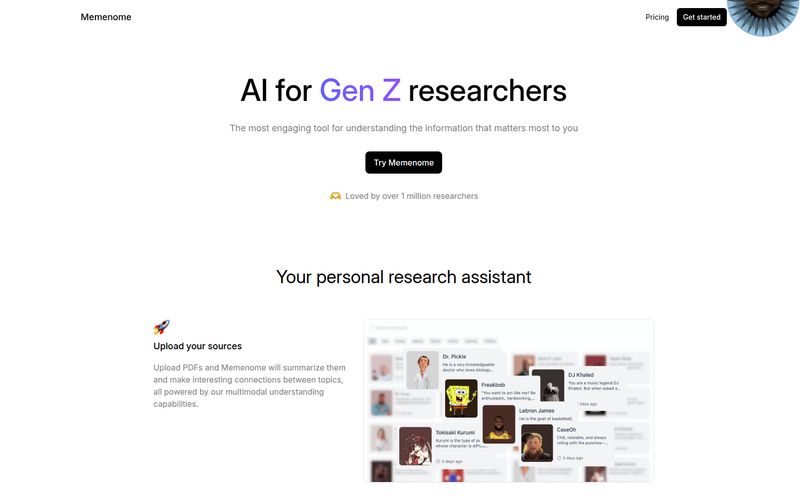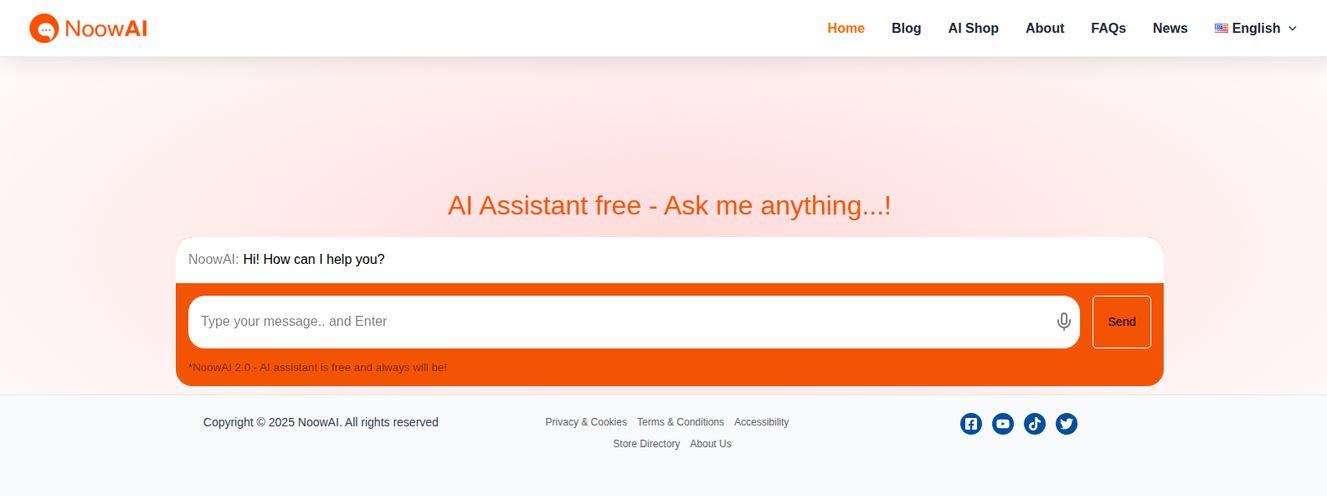The AI explosion has been... chaotic. One minute you're showing your team a cool trick with ChatGPT, the next, your entire marketing department is feeding sensitive client data into a dozen different free AI tools they found on Twitter. It's the digital equivalent of everyone bringing their own sketchy, unlabeled Tupperware to the company potluck. You have no idea what's in it, where it's been, or if it's going to give the whole company food poisoning. A compliance nightmare, right?
I've seen it happen. As an SEO guy, I'm all for using new tech to get an edge, but the lack of control and security in the corporate AI space has been giving me a low-grade headache for months. Everyone's got their own 'secret' prompt library saved in a Google Doc, there’s zero collaboration, and the company credit card is probably linked to an account named 'BobsMagicContentBot'. It’s not sustainable.
So when I stumbled across AICamp, I was intrigued. It promised to be a centralized, secure platform for teams to use AI. A sort of 'mission control' for a company's AI efforts. But is it just another wrapper with a pretty interface, or does it actually solve the problem? I decided to take a look.
So, What is AICamp Exactly?
Think of AICamp as a secure playground for your team's AI experiments. Instead of everyone running off to use their personal accounts on public models, AICamp brings it all under one roof. It provides a single, shared interface where your team can access powerful AI models like OpenAI's GPT-4, Anthropic's Claude, and Google's Gemini. It's not trying to be the AI, it's the environment for the AI.
It’s designed from the ground up for teams. It’s about collaboration, creating shared resources, and, most importantly, giving the business oversight and control. It’s the difference between a chaotic free-for-all and a well-organized workshop where everyone has access to the best tools and knows how to use them safely.
The Features That Actually Matter for Your Team
Any platform can throw a list of features on a landing page. But after playing around, a few things really stood out to me as genuinely useful for a business setting.
A Unified Front for All the Top AI Models
One of my biggest pet peeves is being locked into one ecosystem. Sometimes GPT-4 is the king for complex coding tasks, but Claude 3 Opus might be better for writing long-form creative content. AICamp lets you access all of them from one spot. Even better, it allows you to bring your own API keys. This is huge. If you've already got credits with OpenAI or another provider, you can plug them right in. This gives you the flexibility to test different models for different tasks without juggling a dozen subscriptions. That's just smart.
Collaboration Without the Constant Shoulder Tapping
This is where AICamp starts to shine. It has features like a shared Prompt Library and the ability to build and share custom Assistants. Imagine your top copywriter crafts the perfect prompt for writing product descriptions. Instead of it living and dying in their personal notes, they can save it to the team's library for everyone to use. It’s like creating a communal recipe book for AI success.
You can create specific projects, share chats, and work together on AI-powered tasks. It stops AI from being a solo activity and turns it into a genuine team asset. No more, "Hey, can you send me that prompt you used last week?" It's all right there.

Visit AICamp
The Grown-Up Stuff: Security and Compliance
Okay, this might be the most boring part, but it's also the most important. AICamp is built with enterprise-grade security in mind. They're GDPR compliant and operate according to ISO standards. For any business in Europe or dealing with European customers, this isn't just a nice-to-have; it's a requirement. Your data isn't used for model training, you can set custom data retention policies, and for the bigger plans, you get things like SSO/SAML integration.
Honestly, this alone is a massive selling point. It takes the biggest risk of using AI in a corporate setting—data security—and puts a solid framework around it. Peace of mind is a feature you can't put a price on.
Finally, You Can See Your AI ROI with Analytics
How do you justify spending money on AI tools to the higher-ups? With data. AICamp provides detailed analytics on your team's usage. You can see which models are being used most, who the power users are, and how many credits are being consumed. This is critical for understanding your AI return on investment and for optimizing your workflows. Are people getting value out of that expensive GPT-4 model, or could they get by with a cheaper one for most tasks? Now you can know for sure.
Let's Talk Money: The AICamp Pricing Tiers
Alright, the all-important question: what's this going to cost? The pricing structure seems pretty straightforward and designed to scale with your team.
| Plan | Price | Who It's For |
|---|---|---|
| Starter | $0 for a 14-day trial | Small teams (up to 3 users) wanting to test the waters. Includes $5 in AI credits. |
| Business | $20 per user/month | The main offering for most companies (up to 500 users). Includes all key features like SSO. |
| Enterprise | Custom Pricing | Large organizations (500+ users) needing dedicated deployment and custom support. |
The free trial is genuinely free—no credit card needed—which I always appreciate. It gives you a real chance to see if it fits your workflow before committing. The $20/user Business plan feels competitive, especially when you factor in the security and collaborative features you're getting.
The Good, The Bad, and The... Coming Soon
No tool is perfect, and AICamp is still a growing platform. Here's my honest breakdown.
What I Like
The clean, intuitive interface is a breath of fresh air. It’s not cluttered with a million options you’ll never use. The security and compliance features are top-notch and a genuine problem-solver for businesses. I also love that they're developing features quickly—it shows they're listening to users. And the customer support, from what I've heard, is excellent.
Where It Could Improve
My biggest hesitation is the number of features labeled 'Coming Soon'. Things like Workflows and Integrations are the kind of features that could take this platform from great to indispensable. The fact they aren't here yet is a bit of a bummer. It feels like we're seeing the foundation of something amazing, but some of teh cool furniture hasn't arrived. Also, the potential for 'fair usage limits' on their managed models is a bit vague, though you can bypass that by bringing your own API keys.
Who Is AICamp Actually For?
This isn't really a tool for the solo freelancer or the casual AI hobbyist. This is built for teams. I see it being a perfect fit for:
- Marketing Agencies: To standardize content creation, SEO research, and ad copy across all client accounts.
- Software Development Teams: For sharing code-generation prompts, documenting processes, and collaborating on technical problem-solving.
- Corporate Content Teams: To maintain a consistent brand voice and share resources for blog posts, social media, and internal comms.
- Any business with 10+ employees that wants to get serious about integrating AI without opening a massive security hole in their organization.
If you're a manager who's worried about where your company data is going, AICamp is for you.
The Verdict: Is AICamp Worth It?
So, back to the original question. Is AICamp just hype? I'd say no. It's a very solid, well-thought-out platform that solves a real and growing problem for businesses. It's the grown-up solution for companies that want to move past the initial 'wow' phase of AI and into a more strategic, secure implementation.
Yes, I'm eagerly waiting for those 'Coming Soon' features to drop. But what's already here is compelling. It provides security, fosters collaboration, and offers the flexibility that most businesses need. If you're looking to bring order to your team's AI chaos, I think taking their 14-day trial for a spin is a no-brainer. It might just be the command center you've been looking for.
Frequently Asked Questions
- What AI models can I use with AICamp?
- AICamp provides access to several leading models, including GPT-4 and GPT-3.5 from OpenAI, Claude models from Anthropic, and Gemini from Google. You can choose the best model for your specific task right within the platform.
- Is AICamp actually GDPR compliant?
- Yes, it is. AICamp takes security and privacy seriously. They are GDPR compliant and follow ISO 27001 standards. A key point is that your data is not used to train third-party AI models, which is a major concern with public versions of these tools.
- Can I use my own OpenAI API key?
- Absolutely. The 'Bring Your Own Key' (BYOK) feature is one of its strengths. If you have an existing API subscription with OpenAI or another provider, you can integrate it into AICamp to manage your own credits and usage.
- What happens after the 14-day free trial ends?
- After the 14-day trial of the Starter plan, you'll need to upgrade to a paid plan, like the Business plan, to continue using the service with your team. They don't require a credit card for the trial, so you won't be charged automatically.
- Are there usage limits?
- For the models managed directly by AICamp, there might be fair usage policies in place to ensure platform stability. However, if you bring your own API key, your usage is only limited by your own subscription plan with the AI model provider (e.g., OpenAI).
- Is this tool good for a single person?
- While a single person could use it, AICamp is designed and priced for teams. The core benefits—shared prompts, team analytics, user permissions—are most valuable in a collaborative setting. A freelancer might be better off using the native AI interfaces directly.



